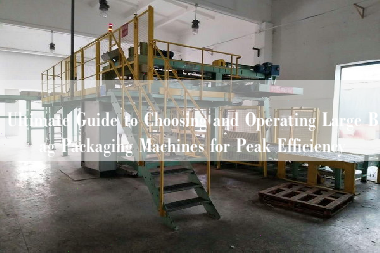1. Exploring Your Ideal Large Bag Packaging Machine Selection Guide
1.1 Core Advantages and Industry Applications of Large Bag Packaging Machines
Large bag packaging machines deliver transformative efficiency for bulk material handling. These systems automate the filling, sealing, and handling of woven poly bags and plastic pouches ranging from 25kg to 2,000kg capacities. Key advantages include:
- Labor Reduction: A single Bag Inserting Machine replaces 3-5 manual operators in bag placement and filling stations.
- Throughput Maximization: Automated systems achieve consistent 8-12 bags per minute, eliminating human speed limitations.
- Product Integrity: Precision weighing systems maintain ±0.2% accuracy, critical for food and pharmaceutical compliance.
- Material Savings: Automated seam sealing reduces bag breakage rates by 90% compared to manual handling.
Primary industry applications:
– Food Processing: Flour, sugar, and grain packaging requiring USDA/FDA-compliant designs
– Chemicals: Fertilizers, resins, and industrial powders with dust containment features
– Pharmaceuticals: Hygienic construction for active ingredients and bulk compounds
– Building Materials: Cement, sand, and aggregates in rugged industrial environments
1.2 Evaluating Top-Performing Large Bag Packaging Machines
Selecting best-in-class equipment requires assessing these critical parameters:

- Bag Specifications: Confirm machine compatibility with your bag dimensions (LxW), spout types, and material thickness (gsm).
- Material Characteristics: Free-flowing granules require different auger systems than cohesive powders; explosive dust needs ATEX-rated components.
- Automation Level: Semi-automatic systems suit low-volume operations; robotic palletizer integration enables complete lights-out production.
- Key Performance Metrics:
- Cycle times under 7 seconds per bag
- 99.5% operational uptime guarantees
- ≤0.1% product loss during transfer
- Certifications: Seek ISO 9001 manufacturing with local UL/CE compliance documentation.
Prioritize suppliers offering material testing labs for validation trials before purchase.
1.3 Recommended Models and Strategic Procurement
Yanmao’s top-performing systems include:
- Vertical Form-Fill-Seal (VFFS) Series: For poly bags up to 50kg with integrated checkweighers
- Premier Bag Inserting System: Processes 1,200+ woven poly bags/hour with automatic gusset control
- Robotic Bag Palletizing Cells: Integrates with filling lines for direct palletization without conveyors
Procurement strategy essentials:
– Request on-site production audits of existing installations
– Validate spare parts availability in regional warehouses
– Negotiate performance-based service contracts
– Leverage container-load discounts for multi-unit purchases
Next Step: Submit your bag specifications for a custom ROI analysis at Yanmao Packaging Systems Consultation
2. Mastering Large Bag Packaging Machine Operation and Maintenance
2.1 Operational Procedures for Large Bag Packaging Systems
Proper operation ensures peak performance of Bag Inserting Machines. Follow these essential steps:
-
Pre-Operation Checks
– Verify compressed air supply maintains 6-8 bar pressure
– Confirm vacuum systems achieve ≥90% efficiency
– Inspect sealing jaws for residue buildup
– Calibrate load cells to ±0.1% accuracy -
Bag Loading Protocol
– Position woven poly bags on magazine with gussets outward
– Align spout patterns with feeding mechanism guides
– Maintain ambient humidity below 60% to prevent static -
Automated Filling Sequence
– Initiate automated cycle: Bag opening → Spout attachment → Filling → Sealing
– Monitor fill weights via integrated PLC touchscreen
– Adjust auger speeds for cohesive powders (e.g., flour) versus free-flowing granules (e.g., fertilizer) -
Post-Process Handling
– Engage conveyor synchronization with palletizers
– Activate dust collection systems during material transfer
2.2 Safety Protocols and Efficiency Optimization
Operational excellence requires strict safety adherence and continuous improvement:
Critical Safety Measures
– Install light curtains with <14mm resolution around moving parts
– Implement lockout-tagout (LOTO) procedures during jam clearance
– Require ANSI Z87.1 safety glasses near filling stations
– Conduct arc flash risk assessments for electrical panels
Throughput Enhancement Techniques
– Program variable frequency drives (VFDs) to reduce cycle times by 15-20%
– Implement predictive anti-jam algorithms for challenging materials
– Utilize quick-change tooling for bag size transitions (<5 minute changeover)
– Integrate machine vision systems to detect sealing defects at 200 bags/minute
Downtime Reduction Strategies
– Pre-stage common bag sizes during shift changes
– Standardize operator training using Yanmao’s virtual reality simulators
– Analyze OEE data to identify bottlenecks in spout attachment sequences
2.3 Maintenance Routines and Troubleshooting
Preventive maintenance extends equipment lifespan by 30-40%:
Daily Maintenance Checklist
– Lubricate linear guides with food-grade grease (NSF H1)
– Clean vacuum cups with isopropyl alcohol
– Inspect pneumatic cylinders for seal integrity
– Verify torque settings on critical fasteners
Weekly Procedures
– Recalibrate weighing systems using certified test weights
– Replace worn gripper pads on bag manipulation arms
– Conduct vibration analysis on drive motors
– Clean dust accumulation from electrical enclosures
Common Fault Resolution
| Symptom | Diagnostic Action | Solution |
|———|——————-|———-|
| Inconsistent seals | Check jaw temperature profiles | Replace heating elements; Adjust pressure settings |
| Bag misalignment | Inspect photoelectric sensors | Realign sensors; Clean optical surfaces |
| Weight variation | Test load cell drift | Recalibrate; Check for mechanical binding |
| Pneumatic failures | Monitor pressure drops | Replace air filters; Inspect solenoid valves |
Emergency Shutdown Protocol
1. Activate emergency stop button
2. Isolate energy sources per LOTO procedures
3. Report incident via Yanmao’s remote diagnostic portal
4. Await certified technician assessment
Proactive Resource: Download Yanmao’s maintenance calendar at Equipment Care Portal
